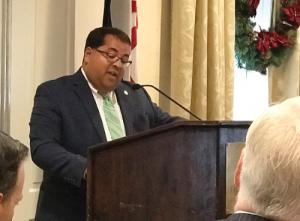It was a packed house. The FERC Chair, now Commissioner Neil Chatterjee, was the guest speaker at the Natural Gas Roundtable’s November 30 luncheon.

He started by saying he would not discuss the Energy Secretary’s grid resiliency pricing NOPR. And with a wry smile, invited anyone present to leave if that’s the only reason they had come.
Seeing no one departing, Chatterjee proceeded to talk about the challenges in natural gas pipeline permitting and particularly the time it takes to permit. Here are two especially interesting excerpts. You can see these remarks in video form on the fortnightly.com website.
“Be assured I am committed to working with FERC staff and my colleagues on the commission to do all we can to streamline the process and provide timely resolutions on projects. Despite that commitment, I know it won’t be an easy task. As I identified in my remarks to the Energy Bar Association, increased stakeholder participation in our review processes is the prime factor in extending timelines for major projects.
Today I want to expand on that point and offer my personal view on just how increased stakeholder participation has drawn out further review processes. First, it is not hard to see that opposition to natural gas pipeline projects has become more ideologically-driven than it used to be.
In the past, much of the stakeholder resistance to natural gas pipeline projects resulted from local interests of individual landowners and communities. That is, these parties’ opposition grew from their desire to avoid construction of a pipeline in their community or from their desire to avoid the exercise of eminent domain on their land.
Of course, those remain core concerns for many stakeholders. But what’s new is this. Increasing anxiety about carbon emissions has given rise to a national ‘keep it in the ground’ movement resisting any natural gas project as a matter of principle.
Pipeline opponents seem increasingly willing to look to the federal courts to advance their agenda. I understand that many of those opposing pipelines feel they have been shut out of the political and administrative processes of the federal government, prompting them to look increasingly to the courts to obtain relief. It’s evident that these folks are growing more confident in their chances in taking those challenges to the D.C. circuit in particular and other federal appellate courts.
This impacts FERC not only because it means that we can expect to be involved in litigation on a number of fronts, but also because it could force the commission to become even more deliberate in its review processes to ensure that they will withstand judicial review.”


